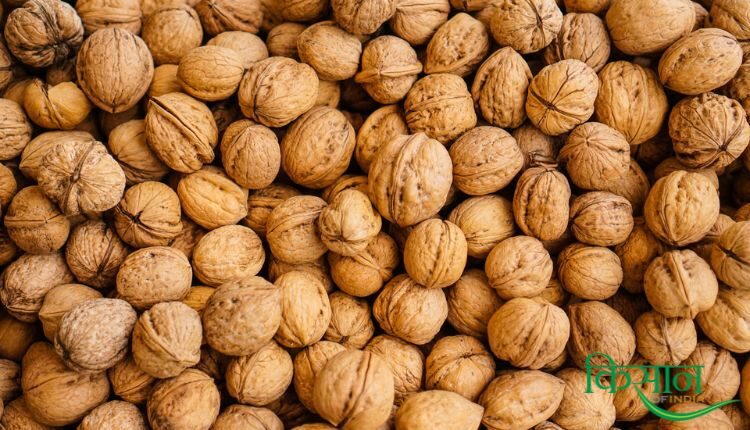Walnut production : 90% of India’s walnuts are produced in Kashmir, but How ?
In Kashmir, walnut trees begin to bloom at beginning of the spring season in the month of March to April.
In recent years the demand for Kashmiri walnut has increased both in domestic and international markets. Kashmir was once the second largest producer of walnuts in the world, while today it is not even in the top ten. The problems that the Kashmiri nuts industry is facing are the lack of infrastructures such as transport, power supply and packing facilities, and the absence of markets for the nuts.
90% production in Kashmir
Kashmir accounts for 90% of India’s walnut production. With its superior quality and taste, cashmere nuts are a great source of nutrients and are therefore in high demand all over the world. There is immense potential for this product to carve out a place for itself in local and global markets. The area under walnut cultivation in Jammu and Kashmir is currently 89,339 hectares. Every year, India produces around 35,000-40,000 tons of walnuts in the major valleys. According to traders, India imported 22,000 tonnes of walnuts last year.
The slowdown in the harvest may affect walnut exports. In the 2018-2019 season, India exported 1,874.87 tonnes worth Rs. 66.7 crore according to The Agricultural and Processed Food Products Export Development Authority (APEDA). The main importers were Germany, the United Kingdom, the United States, the Netherlands and France.

How walnuts are produces in Kashmir ?
Walnut trees in Kashmir are propagated mainly by seedlings and take about 13 years to produce their first crop. However, a fully grown walnut tree can produce up to 120 kg of nuts for about 100 years. In Kashmir, the walnut trees begin to bloom at the beginning of the spring season in the month of March to April. Fruiting begins soon after and is followed by shell hardening, which usually takes longer. Mainly, three types of walnuts are grown in the Kashmir Valley.
Wonth: This type of nut is hard and not easily cracked. It has a thick and large outer shell and a small nucleus. This type of Kashmiri nut is sold locally and is mainly used for oil extraction.
Kagazi: This nut variety is relatively larger in size. Its outer shell is thin and the nucleus is large and white in colour. Kagazi nut can be cracked with bare hands.
Burzul: This Kashmiri nut is medium in size. It has a dark and thick outer shell. The kernels are very tasty and not completely white. The nuts can be cracked quite easily.
In Kashmir, nuts are grown in Kupwara, Shopian, Baramulla, Budgam, Srinagar, Anantnag and other mountainous regions.

Challenges in Walnut production
According to Foreign Agricultural Science, USDA, during 2018-19, India imported 13,640.49 metric tons of walnuts worth Rs 267.86 crore. Imports rose sharply next year, 2019-20, to reach 21,305.23 metric tons at Rs.494.93 crore. Last year, imports almost doubled to 35,021.54 metric tons at a cost of Rs 667.16 crore. By 2030, to meet domestic and export demand, we need to produce 4.98 lakh tons in an area of 1.66 lakh ha with average productivity of around 3 tons/ha of walnut.

Scope for Walnut production
Jammu & Kashmir has a wide scope of expanding the area of walnut trees by establishing regular orchards like an apple tree, providing farmers with good quality disease-free planting material, by establishing nurseries and mother orchards of lateral cultivars of high performance.
Horticulturists and trade representatives recommended that the way forward includes national and international marketing through Buyer-Seller Meets, e-commerce incorporation of more agricultural and artisan/handloom products, as well as product/handloom awareness creation scheme for products from each district that will be supported by the ODOP Initiative of the Ministry of Commerce and Industry.
Also Read: Sharmila Oswal started business with farmers who are cultivating coarse grains
Contact us – If farmers want to share any valuable information or experiences related to farming, they can connect with us via phone or whatsapp at 9599273766 or you can write to us at “[email protected]”. Through Kisan of India, we will convey your message to the people, because we believe that if the farmers are advanced then the country is happy.



